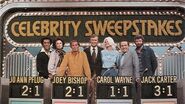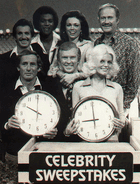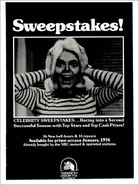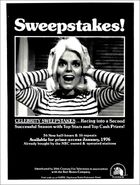| Host | |
| Jim McKrell | |
| Announcers | |
| Bill Armstrong Dick Tufeld (sub) John Harlan (sub) | |
| Broadcast | |
| NBC Pilots: 1/23/1974NBC Daytime: 4/1/1974 – 10/1/1976 Syndication (Weekly): 9/9/1974 – 9/1975, 9/20/1976 – 5/23/1977 (reruns aired until 9/1977) | |
| Packagers | |
| Ralph Andrews Productions/ Burt Sugarman Productions | |
| Distributors | |
| Carbie Productions (1974–1975) 20th Century Fox Television (1976–1977) | |
"Here are today's celebrities. (insert celebrities) Here are the contestants. And the people who set the odds. Our entire studio audience. Every single one of them ready to play, CELEBRITY SWEEPSTAKES. And here's the host of Celebrity Sweepstakes, Jim McKrell!"
Celebrity Sweepstakes was the wacky celebrity game show based on horse racing.
Gameplay[]
The game used a horse racing motif as its premise. Two contestants (originally three in the early weeks) competed for the entire show, and started the game with $20 (sometimes $50) each, trying to predict which of six celebrities would correctly answer questions posed by the host. As stated by McKrell at the beginning of the show, the celebrities did not receive the questions in advance of the taping. However, the questions were based on biographical information that had been taken from the celebrities. This information (strengths and weaknesses) was provided to the audience and contestants via "tip sheets", akin to actual horse racing forms.
Round 1[]
McKrell would read a question, and people in the studio audience would then vote for who they thought would answer the question correctly. After the voting took place, a totalizator set odds on each celebrity. The celebrities that had the greatest vote of confidence from the audience would be dubbed the "Favorite(s)", and have the lowest odds, frequently 1:1 (even money) or 2:1. A celebrity that had few or no audience votes would be dubbed the "Longshot", and have the highest odds, up to 99:1. The contestant in control would then place a bet on who he/she thought would answer correctly, as in "$10 on Nipsey Russell".
In the show's last 13 weeks, the audience was told the category of the question before selecting celebrities.
Contestants could bet $2, $5, or $10 (unless he/she had $10 or less, at which point the bet defaulted automatically to $2) or up to $100, if he/she bet on the favorite out of the panel (near the end of the run, the contestant could bet no more than what they had minus $10 when doing this).
A correct answer would win the contestant the value of the bet times that celebrity's odds (ex: a $2 bet on a celebrity with the right answer and his/her odds at 1:1 would win $2, whereas a $10 bet on a celebrity with 99:1 odds would be worth $990), a wrong answer lost the value of the bet and the opponent could then make a bet of his/her own on that same question. If no celebrity had the correct answer, the question would be thrown out (known as a "scratch" and indicated by a loud horn) and replaced. If either player dropped down to less than the minimum $2 bet, both players were given $2 (or $1 if that player already had $1).
Near the end of the show's run, the celebrities no longer wrote down answers. This made the game run quicker, and made it more likely that a question would be answered, since if the current player's celebrity got the answer wrong, the other celebrities now knew that it was a wrong answer; however, it made it possible that nobody knew a question.
The round was timed.
Round 2: Homestretch[]
In this round, a contestant would have an opportunity to double his/her bet by picking a second celebrity with the correct answer. In the earliest and latest parts of the run, the contestant would lose any money won on the first celebrity if the second celebrity got it wrong, but the contestant had the option of not choosing a second celebrity in this case. If only one celebrity had the correct answer, a bell called the "ice cream bell" (as it sounded like something an old-fashioned ice cream salesman would ring when going around the neighborhood) would ring; selecting the correct celebrity would automatically double the payout.
The All or Nothing Question[]
For the final question of the game, the odds were determined by how a celebrity had performed during the show (referred to by McKrell as the "track record", shown briefly on-screen with a toteboard listing all the celebrities and the number of questions each had correctly answered that show). The odds were calculated according to the number of wrong answers given by a celebrity, so that a celebrity missing two questions was given 2:1 odds, four misses resulted in 4:1 odds, and so on; celebrities who didn't miss any questions were given at even money (1:1). Later in the run, the audience set the odds one more time; at first, the maximum odds were 8:1, but by the end of the run, this lowered to 5:1. The two players secretly and simultaneously selected their celebrities, as well as whether to bet everything they had ("All") or none of it ("Nothing").
There was a significant prize, usually worth around $1,000, for anyone who bet "All" and lost; in one instance, a contestant had what would be an insurmountable lead had she bet "Nothing", but the consolation prize was worth more than what she would win if she bet "All", so she bet "All"; her celebrity got the question wrong, and her opponent bet "Nothing" and won—and won over $10,000 the next day.
Both players kept any cash won on the show. The player with the greatest cash total won the game. Originally, if the game ended in a tie, both players came back, but this changed to both players leaving if they both lost everything on the last question. A contestant with three wins (at one point, five) won a car. Originally, players could stay on until defeated, and they won a car for every three wins. The limit later became three days, then five (with five wins needed for the car, but it was then changed back to three wins for the car, although the five-game limit remained).
On the syndicated versions, two different contestants played each week. The winner of the game received a bonus prize.
Later in the syndicated version, a "fanfare" played in the game meant that the contestants also had a chance to predict how many celebrities had the correct answer. If either prediction, or both, were correct, the player(s) won a bonus prize package called the "exacta". This was also added to the NBC version in the last 13 weeks of its run, although they added a rule where the two players had to choose different numbers.
Promotions[]
This show was involved in NBC's first cross-game promotion, held on St. Patrick's Day in 1975 and called "Shamrock Sweepstakes". Players from NBC's six daytime game shows at the time (Sweepstakes, High Rollers, Wheel of Fortune, Hollywood Squares, Jackpot, and Blank Check) answered a set of questions dealing with Ireland and Irish/Irish-American people; the one who got the most correct won $100,000.
A later promotion involved home contestants; over a week, celebrities played the game (mainly from NBC soap operas, although Chuck Woolery and Susan Stafford of Wheel of Fortune appeared on the last day), each playing for someone at home, but in order to win, the home player had to be able to answer the phone when called. (One contestant would have had the lead, but her phone was busy; fortunately, she was drawn by another celebrity, who ended up with the highest score.) The top three celebrities (whose home contestants answered the phone) won their game amounts for their home contestants, plus an extra $75,000 to the winner, $20,000 for second, and $5,000 for third.
Broadcast history[]
CS joined the NBC daytime lineup on April Fools Day, replacing the year-old Heatter-Quigley word game Baffle. Running its first nine months at 12:30 PM (11:30 AM, Central), the show struggled at first against television's oldest daytime serial, CBS' Search for Tomorrow, and the ABC hard quiz Split Second.
But on January 6, 1975, NBC relocated it to 10:00 AM (9:00 Central) where it finally found a large audience, besting CBS' The Joker's Wild soundly, which led to the latter show's cancellation that summer. CS served as the lead-in for Wheel of Fortune during the latter show's first year.
However, on November 3, CBS expanded The Price is Right to a full hour, that network's first regular hour-long daytime program. CS began to decline after that point, with NBC moving the show on June 14, 1976, when the network gave the 10/9 slot over to reruns of the prime-time sitcom Sanford and Son. NBC later on decided to knock it down a half-hour, against the second half of Price where it did no better than opposite the first. CS aired its final NBC episode on October 1, clocking in exactly a 30-month run to the day. Hollywood Squares would take over the 10:30/9:30 slot.
Andrews and Sugarman syndicated CS originally in September 1974 as a concurrent companion to the NBC version; it was a weekly offering that appeared mainly in medium-to-large-sized markets during local stations' Prime Time Access slots of 7 to 8 p.m. Eastern or 6:30 to 7 p.m. Central. CS did not get renewed by its syndicator for the next season.
In the late Spring 1976, Andrews and Sugarman tried it again. CS met with no greater success in 1976-1977 than it had two years earlier, and the program ended production at the end of that season.
International Versions[]
A short-lived Australian version known as All-Star Sweepstakes hosted by John Newman, ran on ATV-0 in Melbourne from September 1977 until January 1978.
A short-lived British version under the name The Sweepstakes Game hosted by Bernard Braden, ran on ITV for only three months from 3 July (July 3) until 24 September (September 24) 1976, with a Christmas special airing later in the year as the final episode.
A long-running Japanese version called Quiz Derby (クイズダービー) hosted by Kyosen Ohashi followed by Tokumitsu Kazuo, ran weekly on TBS from 1976 until 1992. It used a similar format but only with five stars instead of six.
Press Photos[]
Trade Ads[]
Music[]
Pilot - “King Porter Stomp” by Pat Williams
Stan Worth
Alan Thicke
Rating[]
Studio[]
NBC Studios, Burbank, CA
Episode status[]
As per NBC policy at the time, most episodes of the daytime version were destroyed. The Pilot and Finale are two notable episodes that exist on the trader's circuit. An episode from 1975 exists at The Paley Center for Media in New York, from the Warhol collection.
Additionally, two audio-only clips of show closes exist in traders' hands - one is the last 30 seconds from January 6, 1975, featuring Chuck Woolery promoting the show airing immediately afterward: The first episode of Wheel of Fortune.
The status of the syndicated versions is unknown. It had been assumed by traders that these episodes, along with the daytime episodes, were in the possession of producer Burt Sugarman. On January 9, 2013, host Jim McKrell was interviewed on the Shokus Radio program "Stu's Show" and seemed to contradict this, saying that the entire run of Celebrity Sweepstakes was destroyed due to the issues of dual ownership between Sugarman and Ralph Andrews[1].
See Also[]
Celebrity Sweepstakes/Episode Guide
Links[]
Celebrity Sweepstakes @ Tim's TV Showcase
Rules for Celebrity Sweepstakes @ Loogslair.net
Curt Alluaume's Celebrity Sweepstakes page
Celebrity Sweepstakes Pilot @ usgameshows.net
Game Show Utopia: Audio clips from Celebrity Sweepstakes
Article about The Sweepstakes Game (courtesy of ukgameshows.com)
Videos[]
Clip of opening at Museum of Classic Chicago TV
YouTube[]
NBC Series Finale
| This page uses Creative Commons Licensed content from Wikipedia (view authors). |








